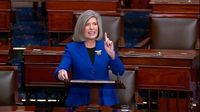With the 2026 midterm elections still more than a year away, the political landscape is already shifting dramatically as key figures announce their plans and parties scramble to seize new opportunities. Nowhere is this upheaval more evident than in Iowa and Pennsylvania, where surprise retirements and high-profile candidacies are injecting fresh uncertainty—and urgency—into the battle for control of Congress.
On September 2, 2025, U.S. Senator Joni Ernst of Iowa confirmed via a video post on social media that she will not seek reelection in 2026, ending months of speculation about her future. "While this chapter of elected office will soon close, I will always find ways to best serve my community, state and these great United States of America," Ernst said in her announcement, as reported by TNND. Her decision not only opens up a coveted Senate seat in a state known for its long-serving incumbents, but also marks the second unexpected retirement for Senate Republicans ahead of the 2026 midterms, following Senator Thom Tillis of North Carolina.
Ernst, first elected in 2014 to succeed Democrat Tom Harkin—who held the seat for three decades—helped solidify Iowa's rightward shift over the past decade. The state, once considered a bellwether, has steadily trended Republican, with both Senate seats and the governorship under GOP control since 2014. Yet, according to The Associated Press, the loss of an incumbent could make the upcoming Senate race far more competitive, especially as Democrats eye a return to swing-state status for Iowa.
"One of the questions is to what extent Trump voters are going to come out in a midterm. Democrats, I think, are hoping for some combination of the Trump voters won't turn out, and the party that doesn't control the White House does better in the midterms," Tim Hagle, a political science professor at the University of Iowa, told TNND. He noted that this cycle, Democrats appear to be fielding higher-profile candidates than in previous years.
Indeed, several Democrats have already thrown their hats into the ring, including former state Rep. Bob Krause, state Sen. Zach Wahls, state Rep. Josh Turek, Jackie Norris (a former chief of staff to Michelle Obama and current Des Moines school board chair), and Nathan Sage, a former local chamber of commerce president. On the Republican side, the field is expected to be equally competitive, with three-term Rep. Ashley Hinson widely seen as a frontrunner, alongside former state Sen. Jim Carlin and veteran Joshua Smith, who had previously announced challenges to Ernst.
The Cook Political Report had rated Iowa’s Senate race as “likely Republican” before Ernst’s announcement. However, the sudden absence of an incumbent may tilt the odds, with Democrats sensing a rare opportunity. Iowa Democratic Party chair Rita Hart was quick to seize on the opening, stating, "Joni Ernst is retiring because she knows that Iowans are furious at her and Washington Republicans for threatening our health care and spiking costs for families. No matter which Republican runs for this seat, they can’t hide from the harm the GOP has caused to working families across Iowa."
Yet, the path for Democrats is anything but smooth. Republicans maintain a voter registration advantage, control all of Iowa’s congressional seats, and have won the state in the last three presidential elections. The high share of independent or “no party” voters, however, means close contests could swing in unexpected directions, particularly if turnout patterns shift.
Meanwhile, President Donald Trump is already ramping up efforts to maintain Republican control of Congress, adopting a more aggressive version of his 2018 midterm playbook. According to recent reporting by AP and TNND, Trump’s strategy includes emphasizing crime and immigration to energize the GOP base, deploying National Guard troops to U.S. cities, and pressuring Republican-led states like Texas, Florida, and Indiana to redraw congressional districts in their favor. He’s even floated the idea of a first-ever pre-midterm convention to further boost enthusiasm among Republican candidates. "I think crime will be a big subject of the midterms and will be the big subject of the next election," Trump declared during a recent Cabinet meeting, as reported by AP.
Despite Trump's confidence, polling suggests the issues animating voters are complex. An AP-NORC poll showed that 53% of U.S. adults approve of Trump’s handling of crime, but only 3% named "crime/violence" as their top concern in a recent Gallup poll. Economic worries and government leadership ranked much higher. This disconnect hints at the challenges both parties face in mobilizing their respective bases.
Democrats, for their part, are grappling with internal debates over how best to counter Trump’s agenda in his second term. Some strategists advocate for conceding ground on contentious social issues, while grassroots activists push for a more combative posture. Christopher Nicholas, a veteran Republican consultant, cautioned against reading too much into Democrats’ current low approval ratings: "They’re the only other game in town," he told AP, suggesting that turnout—rather than public opinion—will likely decide key races.
In Pennsylvania, the Democratic recruitment machine is in full swing. On September 2, 2025, Scranton Mayor Paige Cognetti announced her bid for Congress, joining a growing list of high-profile Democrats vying for seats in a state seen as the party’s best chance to flip the U.S. House. As reported by the Harrisburg Bureau, Cognetti—a corruption-fighting, independent-minded mayor with experience in the U.S. Treasury Department and local school board—will challenge freshman Republican Rep. Rob Bresnahan in a district that has swung between parties and is the birthplace of President Joe Biden.
Cognetti’s candidacy is emblematic of the Democrats’ strategy in Pennsylvania, where redistricting is off the table due to a divided legislature. Instead, the party is betting on strong candidates and local appeal. "People here are sick of self-serving politicians," Cognetti said. "I’ve shown in Scranton that we can build government for people and be honest with people. I have done it with an independent streak and I think we will be able to take that successfully to the whole district."
Pennsylvania holds four of the 35 House seats nationwide that Democrats are targeting in 2026. Three of those—Bresnahan’s and neighboring districts—were among the narrowest races last year. Brittany Crampsie, a Democratic strategist, told the Harrisburg Bureau, "People want to run in seats where we had to do strong-arming to get candidates to say ‘yes’ last year, three years ago." She called Cognetti and others "the future of the Democratic Party."
Adding to the momentum, the head of Pennsylvania’s state firefighters’ union, Bob Brooks, recently entered the race to challenge Rep. Ryan Mackenzie in the Allentown-area district, bringing union support and a working-class profile. Brooks, who also runs a landscaping and snow-plowing business, said, "The party of labor, I believe, is the Democrat Party, but I don’t think the Democrat Party talks about or to the working class people anymore, and I think we need to get back to that. The Republicans, they talked about us, they talk to us, but then they go down to DC and they vote against us."
With redistricting off the table in Pennsylvania, the outcome will hinge on candidate quality and voter turnout. Nationally, Democrats need just three seats to flip control of the U.S. House, and party leaders say the road to the majority likely goes through battleground states like Pennsylvania and Iowa.
As the 2026 midterms approach, the stakes could hardly be higher. With surprise retirements, ambitious newcomers, and a political climate in flux, both parties are bracing for a bruising fight—one that could reshape the balance of power in Washington for years to come.





